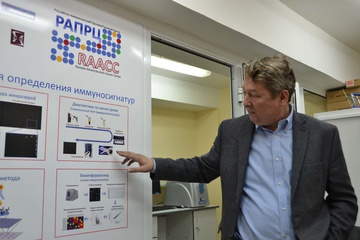TASS: AltSU develops peptide-based cancer therapy technology
 Head of RAACC Andrei Shapoval said in an interview with TASS that the technology can become a cheaper analogue of expensive antibody-based therapy.
Head of RAACC Andrei Shapoval said in an interview with TASS that the technology can become a cheaper analogue of expensive antibody-based therapy.
“2018 Nobel laureates James Allison and Tasuku Hondze identified CTLA-4 and PD-1 molecules that lower the immune response in cancer, and have developed antibody inhibitors, so-called checkpoints, that increase the immune response - the patient’s immune system begins to actively fight against cancer. Now it is considered one of the most promising types of therapy, but the problem is that it is expensive - a course of treatment costs about $100 thousand. We are trying to find peptides that interact with these molecules to use instead of antibodies and block CTLA-4 and PD- 1” said Andrei Shapoval.
He noted that microchips are used in the studies, which help to detect the interaction of molecules and peptides - for Russia this is a unique story. According to the scientist, the use of peptides in the future will be cheaper, they are smaller in size and can sily penetrate tissues more easily, while they are effective, like antibodies. Several peptides have already been isolated, which, as Andrei Shapoval explained, specifically interact with CTLA-4 and PD-1 molecules.
“We plan to conduct these studies in collaboration with the Institute of Fundamental and Clinical Immunology of Novosibirsk. In the future, we will try to make some kind of dosage form for cancer immunotherapy. We hope that it will be safe, because in therapy with monoclonal bodies, for example, there are a number of side effects. We hope that these peptides will help to adequately replace monoclonal antibodies in terms of price and physiological characteristics” Andrei Shapoval explained.
In the near future, scientists will investigate whether the first detected peptides can stimulate the immune response.